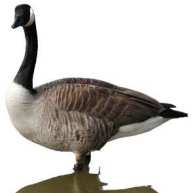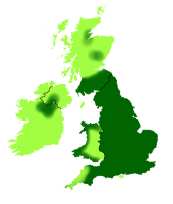|
Photography
|
Canada Goose Plate | ||||
|
|
|||||
| Distinguishing Features |  |
||||
| Height 97cm (38in), Brown/grey back and wings, lighter underneath. Black neck/head with white chin strap. Both sexes alike. | |||||
| Food | |||||
| Mainly vegetarian grazing on grass, will eat insects during the summer months. | |||||
| (Anatidae) branta canadensis |
|||||
|
|
|||||
 |
Nesting | ||||
| Between April and May. Clutch of 5 to 6 eggs, off white in colour. Incubation appx 28 days. Eggs tended by female only, both parents tending the nestlings. | |||||
| Habitat | |||||
|
Lakes, broads, marshlands and open stretches of fresh water. |
|||||
|
The darker green on the map above indicates
where you are most likely to see a Canada Goose.
|
|||||
|
|
|||||
| Other information | |||||
|
The Canada Goose is one of the largest geese in Great Britain. They are striking birds and sociable, forming large flocks. Unafraid of people, they can readily be seen in most urban parks and lakes and can grow to overwhelming numbers in some urban parks. The nest consists of a hollow made in the ground, lined with reeds, down and leaves. They are found on lake islands, or are well hidden in marshlands and broads. Can been seen flying in the unmistakable 'V' formation |
|||||
| [Home] [News] [Gallery] [Birds] [Discover] [About] [Contact] [Members] | |||||